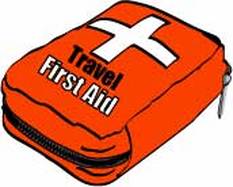Travel First Aid KitThings happen when you travel—accidents, illness, discomfort. Sure, you can buy
a commercial kit. But wouldn't you like to know the natural alternatives? |
|
Though we travel the world over to find the beautiful, we must carry it with us or we find it not. —Ralph Waldo Emerson Article Reprint Tip$ Reprinting to another
website or blog? Consider leaving a tip! Suggested Donations Voluntary
$1 - $5 for Reprint Tips (always free for personal use) $5 - $25 for Website Support (Many Thanks!) |
10 Natural Remedies to Pack

Give yourself peace of mind while you travel by packing a natural first aid kit. Stomach problems, digestive issues, cuts, bruises, or insect bites—travel can be the best of times or the worst, all at once.
A good natural first aid kit holds healthy natural remedies to prevent the worst of travel discomforts and gently restore you back to health. Stock your first aid kit with these multipurpose natural remedies to treat minor ailments and be ready for an emergency. 10. Probiotics for Intestinal Balance
“Where is the toilet?” is probably the most learned travel phrase in any language. Almost everyone experiences intestinal upset while traveling. Diarrhea is the most common problem for travelers. As you visit new regions, you may be exposed to bacteria different from what we are used to. This can change the balance of friendly bacteria versus problem bacteria within your gut. Taking a high quality probiotic can help prevent this unbalance. Begin taking before the trip to increase the number of friendly bacteria. Continue taking throughout the trip to protect your digestive system and keep the problem bacteria in check. 9. Vitamin C Powder
A strong immune system is always the first defense. This is true while traveling, as well. Taking vitamin C is a good way to boost the immune system. Vitamin C is easy to pack and take along. As well as tablets, it comes in a powder that can be mixed into drinks or water. You can also add some vitamin C by squeezing fresh lemon juice into your water, or eating citrus fruits. Also, vitamin C taken in high doses is not harmful, and it can even act as a mild laxative to help keep the digestive system moving along. 8. Ginger Root
For general nausea, ginger root reigns supreme. Plus, ginger is an easily packable choice for traveling. It is antispasmodic and has gas-relieving properties. It can be a great help to relieve some kinds of motion sickness. You can purchase ginger in capsules, as a powder in tea bags, crystallized ginger candy, and, a personal favorite if you can tolerate it: chew on a bit of the dried root. 7. Activated Charcoal
If you are plagued by food sensitivities, food allergies, or suspect food poisoning, activated charcoal tablets or capsules are great to have at hand. Taken internally, it works to absorb and remove what might be causing the problem. The tiny charcoal particles absorb toxins and whatever else should not be there in your gut. Then the absorbed bits are expelled on bowel movements. Note that it will also absorb and expel any medications you might be taking at the same time. 6. Chamomile
Chamomile blossoms and leaves are easy to pack in your travel kit. Simply bring along several chamomile tea bags. Although chamomile is most often drunk as an herbal tea for relaxation, it also eases digestion and has mild antibacterial and anti-inflammatory properties. The tea bags, when cool and moistened, can be placed directly on the skin to soothe skin irritations, such as rashes or mild burns. 5. Tea Tree Oil
Doesn’t tea tree oil seem to be in everything topical? For travel, tea tree oil can be a useful alternative to an antibacterial cream. It helps with infections and is great for healing minor skin cuts and burns. It is also useful for repelling fungus problems like athlete’s foot and infection of the toenails. It can also be effective at relieving insect bites. Note, however, that if you have an infected wound that is not healing easily, you may need to see a health professional for treatment. 4. Aloe Vera Gel
Skin problems can crop up easily during your travels. A good all-around salve for burns, minor scratches or abrasions, and skin rashes is aloe vera gel. For sunburn, it is ideal. It has cooling effects that soothes inflammations. It is also astringent, makes a protective layer, and even softens the skin. Pack the gel form in a small bottle, but it’s great applied straight from the plant. For short trips you can even break off a spike at the base to bring along with you. 3. Goldenseal
Goldenseal is a good multipurpose addition to a natural first aid kit. It is antimicrobial and antiseptic. It’s most commonly used along with echinacea, as in a tea or capsule, as it works as an immune booster for fighting sickness, such as colds or flu. The powder is easy to pack and can be sprinkled over small cuts to stop bleeding. It can be mixed to a paste, applied to an infected cut, and covered with a bandage to draw out infection. Do not use during pregnancy. 2. Coconut Oil
Coconut oil is marvelous for the skin. That alone is reason enough to carry for everyday use, in place of commercial body lotions. It’s a great natural moisturizer and it is very hydrating for when you travel in dry climate areas. It is also calming for rashes or eczema. It is edible, so you can rub it over your lips when they become chapped or dry. Another use is to mix it with the local hot sauce as a heating rub for sore muscles and even arthritis pain. Note that when cool, coconut oil is in a thick lotion-like form, but when it is warm it is liquidized. Be sure to pack in a leak-proof container. 1. Herbal Insect Repellent
Mosquitoes, spiders, biting ants—these seem to show up right on schedule when you are traveling. Insect repellent is a good idea for travel self care. These essential oils are good DEET-free repellents:
Any herbal repellents work well when they are applied liberally and frequently. There are many natural insect repellent products that you can buy. You can also make your own spray insect repellents. And in a pinch, you can rub these fresh green herbs on the skin: lavender, any mints, and basil. Mosquitoes carry serious diseases and sometimes the best plan is to simply try to avoid areas with many mosquitoes, or at least stay indoors during the times of the greatest mosquito activity. |
|
|
For the travel first-aid kit, you may need to repack items into leak-proof travel containers. Of course, you will want to stock other useful first-aid kit items, as well. Pack these additional essentials:
Natural first-aid kits are not solely for travel. Read this SimpleTens article about stocking a Natural First Aid Kit. Learn more about natural remedies at Alternative Medicine. |
CommentsAdd your Question or Comment HERE.
Have a response to this article about natural Travel First-Aid Kits? Be the first to add a Question or Comment.
|
DISCLAIMER The content on SimpleTens is for educational purposes only and designed to support minor health issues, not to replace medical or psychiatric treatment. If you are concerned about a health issue, please see a health professional. Please read the full Disclaimer.




